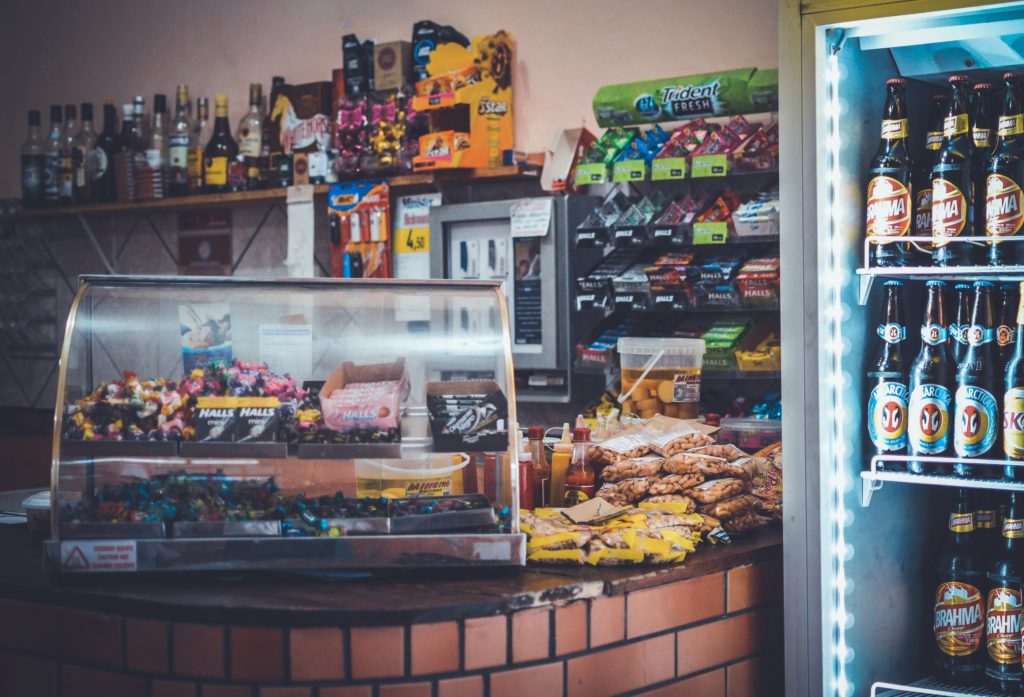The Wonderful World of Snacking Posted by ryan on Sep 18, 2021 in Food, Russian life, Uncategorized
Imagine it’s 10:30am, you had breakfast not too long ago, but you realized that you проголода́лся [have become hungry] and you just can’t make it to your обе́денный переры́в [lunch break]. Мо́жет быть, пора́ закуси́ть что́-нибудь [Perhaps it’s time to snack on something]?
But before we dive into the endless world of snacking and to stuff our бездо́нная я́ма [bottomless pit], let’s learn a bit about snacking in the context of Russian.
The word “snack” is usually translated in one of two ways, but first we should learn an important word:
Куса́ть [to bite]
Maybe you’ve had to assure a stranger on a walk that your соба́ка не куса́ется [dog doesn’t bite].
This is where we get the versatile word кусо́к [a piece, a bit]. Used with the роди́тельный паде́ж [genitive case] we get a piece of something – кусо́к хле́ба, кусо́к то́рта, кусо́к мя́са, кусо́к пи́ццы.
We also see this root in the word вкус [taste, flavor] and вку́сный [tasty, delicious] and even (somewhat disguised) in ку́шать [to eat].
Заку́ска – this usually refers to either a part of a larger meal (something akin to an appetizer or a side dish) or a “chaser” for vodka in the form of чёрный хлеб [black bread], огу́рчики [pickles], or селёдка [herring]. Maybe if you drank a little too much and you’re acting a little crazy, someone will tell you Заку́сывать на́до! Нельзя́ же пить натоща́к! [You should eat something! You shouldn’t drink on an empty stomach!] The prefix за– is reflected in the liquid version of “to chase” – запива́ть.
Переку́с – a light snack between meals. As you can see, it has the prefix пе́ре-, which, in this case, suggests a transition, an idea that finds parity in a common English phrase—to having a snack “to hold you over.” Bota wrote an excellent article about this prefix not too long ago, along with examples of its usage. Забега́ловка – э́то ме́сто, где мо́жно перекуси́ть [A hole-in-the-wall eatery is a place where you can grab a snack.]
But what can you expect to snack on in Russia? Чай is very rarely taken alone, so there are a number of sweet snacks that you can have к ча́ю [with tea], including шокола́д, торт, пиро́жное. Teatime snack time can turn into a full-fledged mid-day dessert, complete with кекс, торт, or the more modern American imports бра́уни or ма́ффины, especially if it’s somebody’s birthday. For a savory snack, you can have some су́шки – dry bread ring things, usually draped over a самовар in every picture of Russian teatime you can find.
During the summer months, expect to snack on арбу́з or any other све́жие о́вощи и фру́кты from the дача. К пи́ву [with beer], the most appropriate snack would be гре́нки [fried pieces of bread], суха́рики [croutons]. But my favorite, of course, is to stop by one of the numerous kiosks, usually located in the city center or near the вокза́л [train station] and grab some пирожки́ [baked or fried buns with a variety of fillings].
I know that you already starving and I would not like anyone to помере́ть с го́лоду [to die of hunger]. So please, go open that bag of чи́псы and finally get back to work!

Build vocabulary, practice pronunciation, and more with Transparent Language Online. Available anytime, anywhere, on any device.





Comments:
David W Roberts:
The word чи́псы must come from American English – we Brits call them Crisps. British chips are part of the traditional British “Fish and Chips” which we can get hot and ready to eat from the chip shop. I think Americans use the word “fries”, but that tends to imply “French fries” which are like our chips but very thin and taste more like American “chips” but a different shape and served hot. So, kak po-russki our British “fish and chips” ?
ryan:
@David W Roberts Yes, David, чипсы is a loan word from American English. What you would call “chips” in known in Russian as картофель фри, and so delicious British fish and chips would be known as “рыба и картофель фри.” I also really enjoy the double plural: “chips” is already plural in English, and with the Russian plural ending -ы added we get чипсы. But English speakers do the same thing with words like “pierogis.”